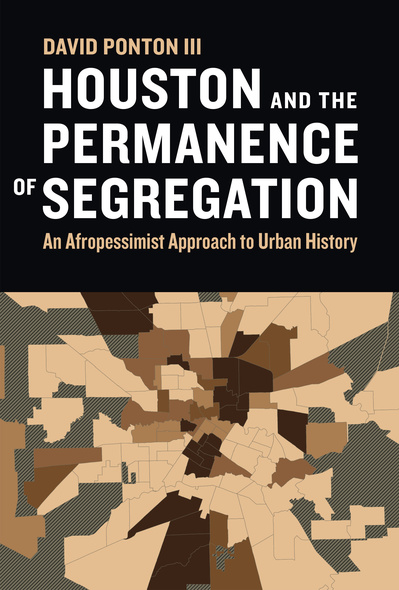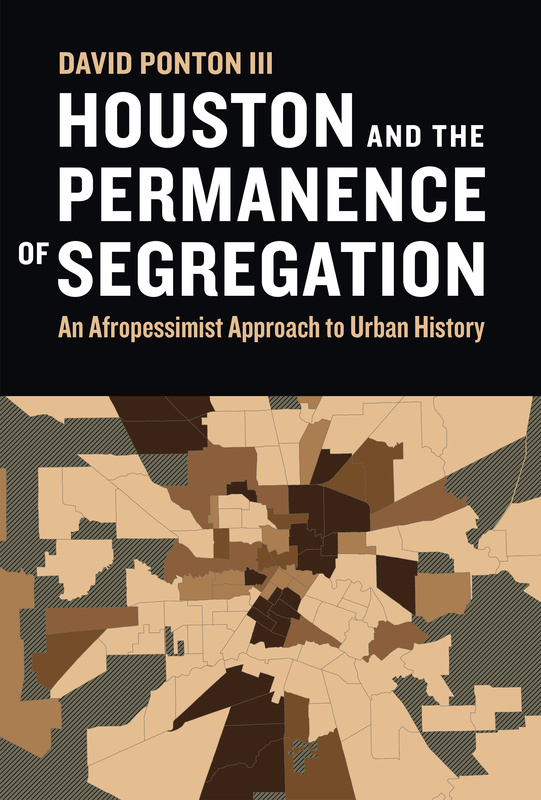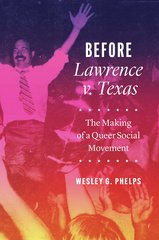Houston and the Permanence of Segregation
An Afropessimist Approach to Urban History
A history of racism and segregation in twentieth-century Houston and beyond.
Through the 1950s and beyond, the Supreme Court issued decisions that appeared to provide immediate civil rights protections to racial minorities as it relegated Jim Crow to the past. For black Houstonians who had been hoping and actively fighting for what they called a “raceless democracy,” these postwar decades were often seen as decades of promise. In Houston and the Permanence of Segregation, David Ponton argues that these were instead “decades of capture”: times in which people were captured and constrained by gender and race, by faith in the law, by antiblack violence, and even by the narrative structures of conventional histories. Bringing the insights of Black studies and Afropessimism to the field of urban history, Ponton explores how gender roles constrained thought in black freedom movements, how the “rule of law” compelled black Houstonians to view injustice as a sign of progress, and how antiblack terror undermined Houston’s narrative of itself as a “heavenly” place.
Today, Houston is one of the most racially diverse cities in the United States, and at the same time it remains one of the most starkly segregated. Ponton’s study demonstrates how and why segregation has become a permanent feature in our cities and offers powerful tools for imagining the world otherwise.
A deeply researched and illuminating exploration of mid-century civil rights history in Houston…Through his extensive scouring of Black newspapers, NAACP investigations, and other contemporaneous sources, Ponton provides a fascinating window onto how individual Black activists thought about their world. It’s a rigorous study of the ins-and-outs of civil rights activism and a significant contribution to the history of Houston.
Houston and the Permanence of Segregation is an exciting challenge to our assumptions about the history of America's long struggle for racial and social justice. The evidence is meticulously gathered, the interpretation searching, and the conclusions unyielding. The 'decades of promise' of the 1940s to 1960s in Houston were, David Ponton III argues, really 'decades of capture' in which racism persisted behind the illusion of progress, and oppressive power remained intact. His provocative remedy: to undertake a radical rethinking of society’s priorities, to put people and the planet first—to dare to imagine a better world. So, while this is one of the boldest and most sobering accounts of postwar American history you are likely to read, it is at the end also one of the most hopeful.
Houston and the Permanence of Segregation powerfully reorients how historians and theorists conceptualize Black resistance and revolt in the American South. Rather than reiterating the nihilism of the Afropessimist paradigm, David Ponton provides a rich historiography showing how Black negation animates the conditions upon which racial epochs occur. The persistence of segregationism, the irrefutable structural facticity of anti-Blackness that denies ontological value to Black life, is given content through the historical murders and contemporary modes of death Black Southern people continue to endure in Houston, Texas. Dr. Ponton powerfully illustrates how intellectually engaging racism’s permanence in the United States creates a richer historiography and advances how one understands Black inhumanity.
David Ponton III is an assistant professor in the School of Interdisciplinary Global Studies at the University of South Florida.
- Introduction: Decades of Capture
- Captured by Gender Roles: Christia Adair’s Fight for Inclusion
- Captured by the Rule of Law: Johnnie Lee Morris’s Trouble on the Bus
- Captured in the Impossible American Dream: Dorothy and Jack Caesar Buy a Home
- Captured by the Role of Gender: Carter Wesley’s “Frustrating Compromises” and the Establishment of Texas Southern University
- Captured by Blackness: Prior Tortures and Law Enforcement’s Reign of Terror at Texas Southern University
- Notes
- Index












